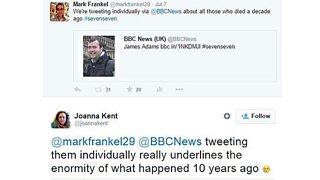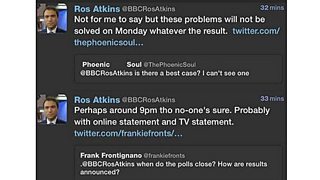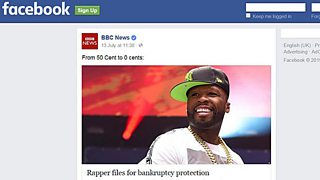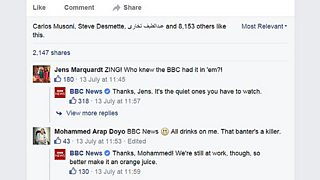Journalists on Twitter: Stop shouting, start listening
Mark Frankel
is BBC News social media editor. Twitter: @markfrankel29
Yvette Cooper has a point. In fact, she has a very good point. Too many politicians use Twitter like they are "shouting in a train station". Journalists are, quite frankly, just as guilty.
Don’t worry, I’m not about to endorse a Labour Leadership candidate. I just want to take a moment of your time to develop her point.
Twitter is a wonderful social media platform for shouting, but it’s eminently possible to reflect and to listen too.
On 7July we decided to spend an hour remembering the victims of the London bombings 10 years ago. There was other news to report and plenty to shout about but I think our followers were supportive of the quiet reflection:

Then, take the BBC’s Ros Atkins. Dispatched to Athens to report for live television and radio on the Greek debt crisis, he found the time to reply to his Twitter followers and maintain a conversation that lasted for days (whilst making very good use of Twitter’s ‘quoted tweets’).

This isn’t just about Twitter. It’s equally possible to find the time and space to respond to comments on Instagram, Snapchat or a Facebook page too (below).

BBC News has millions of fans on Facebook but they won’t hang around for long and explore more of our digital output if we don’t take the opportunity to talk to them occasionally.

Whenever we stop to reflect, listen and reply to comments on our BBC News social media channels, we witness a surge of activity on the social media platform but also a marked increase in referral traffic and the time any individual wishes to devote to the story online.
As journalists we often see all social media as a simple extension of more traditional broadcasting. We want people to ‘watch’ or ‘read’, to ‘tune in at six’ or ‘discover more at 10’. It’s far easier to think about social media as a marketing tool to tease and cross-promote than an opportunity for interaction.
Of course not all news can and should lead to dialogue, but if we can just stop shouting all the time we might all learn a little more about our fans and followers.
Twitter basics for journalists: Q&A with Mark Frankel
Engaging social media audiences
Our special section of social media skills for journalists
Our other blogs by Mark Frankel
Digital interaction? Make sure it’s a two-way street
#BBCTrending’s first question-and-answer session just had to be on Twitter
